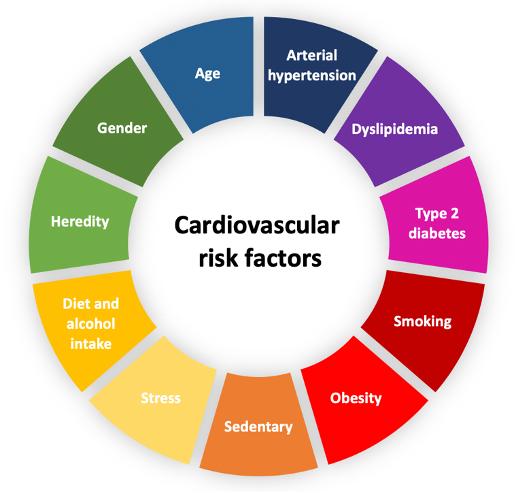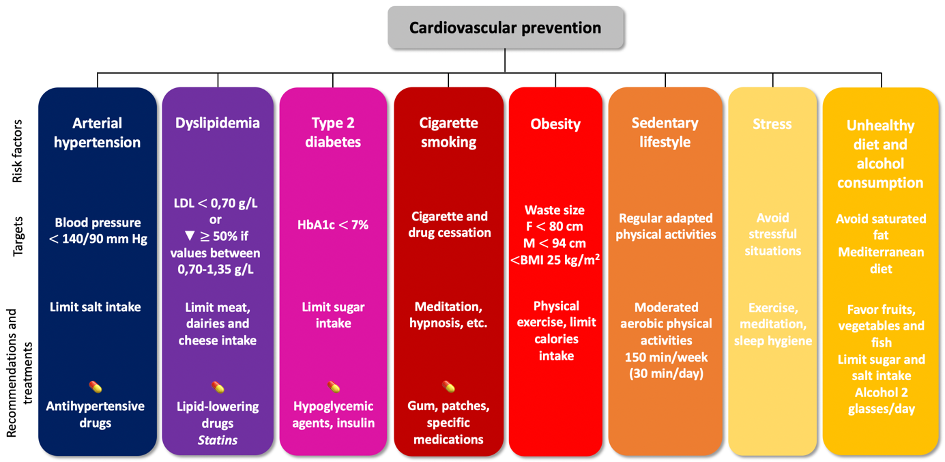How to prevent the occurrence and the recurrence of cardiovascular events?
The treatment of coronary heart disease encompasses several so-called non-pharmacological and pharmacological measures aimed at ensuring adequate management of cardiovascular risk factors, stabilizing and treating the underlying cardiac condition and preventing the occurrence of adverse cardiac events in the future.
Several approaches have been developed worldwide in order to modify harmful lifestyle habits and thus reduce the risk of cardiovascular heart disease, including a modest daily consumption of alcohol, consumption of fruits and vegetables and regular physical activity, all of which confer cardiovascular protective effects.
Risk factors
Which risk factors contributes to fat / cholesterol deposits into the coronary arteries?
Several risk factors contribute to the development of atherosclerotic deposits in the coronary arteries.
Among these, certain risk factors can be modified upon changes in lifestyle habits and following the initiation of pharmacological treatments, while others cannot be modified, such as age, gender and family heredity/genetics.

Arterial hypertension
High blood pressure occurs when there is too much pressure applied in your blood vessels. This can damage your arteries without generating any alarming symptoms and thus promote the deposition of cholesterol/fat in the arterial wall. Although normal blood pressure increases with age, it should not be above 140/90 mm Hg (140: systolic pressure – when your heart contracts and ejects blood to your organs; 90: diastolic pressure – when your heart relaxes and fills up with blood).
Several lifestyle and dietary measures can lower blood pressure, including a low salt diet, weight loss, reduced alcohol consumption, regular physical activity and stress management. These measures are usually combined with drug therapy to achieve target values and reduce your risk of coronary disease.
Dyslipidemia
High levels of total cholesterol in the blood promote the deposition of “bad cholesterol” in the arteries, called LDL-cholesterol, which generates atheroma plaque narrowing or occlusion of coronary arteries that limit normal blood flow to the heart muscle. After a coronary event, the target values for LDL-cholesterol in the blood are < 0,70 g/L or a decrease ≥ 50% if the value is between 0,70-1,35 g/L.
In order to reduce the risk of recurrence of coronary disease, it is essential to adopt healthy dietary habits (i.e. Mediterranean diet) in combination with a statin-based treatment.
Diabetes
Diabetes is associated with high levels of sugar in the blood, which promotes the occurrence of complications in the heart, kidneys, eyes and lower extremities. Thus, poor control of your sugar levels (i.e. blood sugar) significantly increases your risk of heart complications.
A balanced diet with low sugars and fat intake, combined with regular physical activity, weight loss and an appropriate medical treatment will help keep your blood sugar levels in balance. The dosage of glycated hemoglobin (HbA1c), measured by your physician every 3 months, can be used to assess whether your blood sugar levels are in balance. The target value for HbA1c should be < 7%. After a coronary event, it is essential to have regular follow-ups with your treating diabetologist.
Cigarette smoking
Smoking is a major cardiac risk factor and doubles your cardiovascular death rate at 10 years. There seems to be a linear and dose-dependent relationship between the number of cigarettes consumed daily and cardiovascular risk. In fact, the carbon monoxide contained in cigarettes damages the arterial wall and thus promotes the deposition of cholesterol therein, leading to coronary atheroma plaque formation. Passive exposure to tobacco in public places has also similar deleterious effects.
Smoking cessation is the most cost-effective intervention to prevent the development and prevention of coronary stenosis. If you encounter difficulties quitting smoking, it is important to seek help from your treating physician or cardiologist who may prescribe nicotine replacement therapy (gum and / or patches) or other drug treatment that may assist you in succeeding.
Obesity
Abdominal obesity is a major risk factor for coronary heart disease. Measuring your waist circumference is a good indicator of the amount of fat surrounding your organs, which is responsible for metabolic imbalances that are harmful to your heart. Thus, reducing your waistline is very important in order to protect your heart, whose targets are < 80 cm for women and < 94 cm for men.
The body mass index (BMI – weight in kg divided by your height measured in meters) is an indicative measure of total body weight. An obese patient has a BMI > 30 kg/m2, whereas a BMI between 25-29.9 kg/m2 is defined as being overweight. A BMI > 25 has been shown to be a major risk factor for the onset of coronary heart disease.
In order to protect your heart and your arteries, it is recommended to maintain a “healthy weight”, or a BMI between 18.5 to 24.9 in the long term, by balancing physical activity and daily intake of calories. Weight loss should always be gradual so that your metabolism can safely and adequately adapt to the change.
Sedentary lifestyle
Lack of daily physical activity for at least 30 minutes/day is deleterious for your heart. Physical activity has direct positive effects on your cardiovascular system by reducing stress, weight gain, decreasing the risk of cholesterol plaque formation in your arteries and increasing blood levels of “good cholesterol” (HDL- cholesterol). In addition, physical activity promotes the development of collaterals in the heart, a coronary blood vessel network enabling to compensate for the decrease in blood supply to your heart muscle by bypassing the atheroma plaques in your coronary arteries and thus decreasing your symptoms of angina pectoris.
Stress
Stressful events have harmful physiological effects on your heart and can lead to a heart attack. In addition, overwork can lead to a burnout coupled with loss of energy and changes in behavior, which negatively affects your health. Physical activity should be at the center of your daily life in order to improve your physical and psychological well-being.
The occurrence of a heart attack and the resulting changes in lifestyle habits may be upsetting and thus lead to the onset of depressive symptoms. If such symptoms occur, it is important to seek medical attention through your treating physician or cardiologist in order to have adequate psychological counselling, in addition to antidepressant drugs if indicated.
Diet enriched in animal fat, salt and sugar
High intake in saturated fat (animal fats, whole dairy products, cheese), as well as in salt (fried foods, cold meats) and sugar (desserts, pastries, soft drinks) promote the onset of dyslipidemia, arterial hypertension and diabetes. In addition, these foods are high in calories and thus promote weight gain, which is harmful for your cardiovascular health.
A balanced diet, enriched with fruits and vegetables and favoring vegetable fats and fresh fish, reduces your blood cholesterol levels and decreases your body weight.
